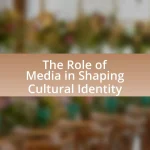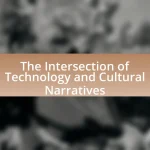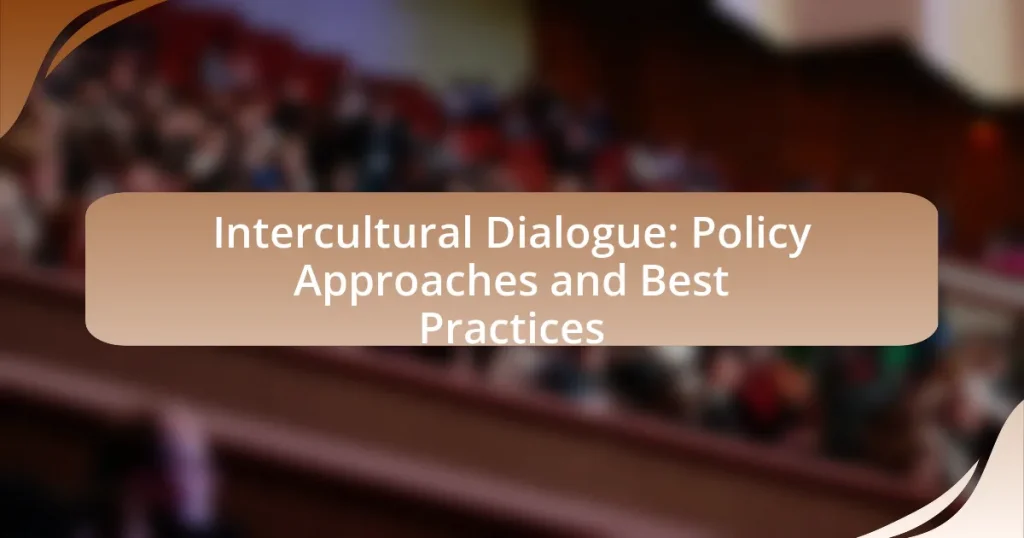Intercultural dialogue is a communication process between individuals or groups from diverse cultural backgrounds aimed at fostering mutual understanding and respect. This article explores the definition of intercultural dialogue across various contexts, its key principles, and its significance in today’s globalized world. It outlines the main objectives of intercultural dialogue, its role in conflict resolution, and policy approaches adopted by different countries to promote it. Additionally, the article discusses best practices for facilitating intercultural dialogue, the impact of technology and social media, and practical tips for engaging in meaningful conversations while avoiding common pitfalls.
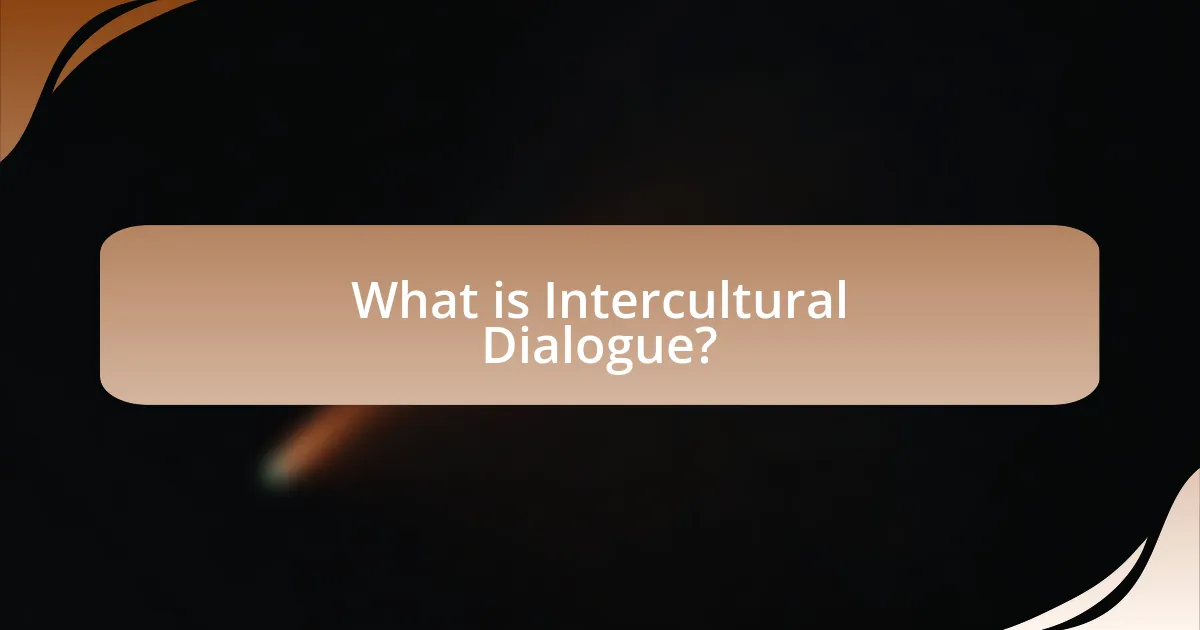
What is Intercultural Dialogue?
Intercultural dialogue is a process of communication and interaction between individuals or groups from different cultural backgrounds aimed at fostering mutual understanding and respect. This dialogue facilitates the exchange of ideas, values, and beliefs, promoting social cohesion and reducing conflict. According to UNESCO, intercultural dialogue is essential for building peaceful societies and is recognized as a key component in addressing global challenges such as migration and cultural diversity.
How is Intercultural Dialogue defined in various contexts?
Intercultural dialogue is defined as a process of communication and interaction between individuals or groups from different cultural backgrounds, aimed at fostering mutual understanding and respect. In educational contexts, it emphasizes the importance of teaching cultural awareness and empathy to promote social cohesion. In policy frameworks, intercultural dialogue is often seen as a tool for conflict resolution and social integration, as highlighted by UNESCO’s emphasis on dialogue as a means to prevent discrimination and promote peace. In community settings, it serves to build bridges among diverse populations, enhancing social capital and community resilience.
What are the key principles of Intercultural Dialogue?
The key principles of Intercultural Dialogue include mutual respect, active listening, openness, and equality. Mutual respect ensures that all participants acknowledge and value each other’s cultural backgrounds. Active listening involves genuinely engaging with others’ perspectives, fostering understanding. Openness encourages participants to share their thoughts and experiences without fear of judgment, while equality ensures that all voices are heard and valued equally in the dialogue process. These principles are essential for creating a constructive environment that promotes understanding and cooperation among diverse cultural groups.
Why is Intercultural Dialogue important in today’s globalized world?
Intercultural dialogue is important in today’s globalized world because it fosters mutual understanding and respect among diverse cultures, which is essential for peaceful coexistence. In a world where globalization has increased interactions among people from different backgrounds, intercultural dialogue helps to bridge cultural gaps, reduce stereotypes, and combat prejudice. According to a UNESCO report, effective intercultural dialogue can enhance social cohesion and promote sustainable development by encouraging collaboration across cultural boundaries. This dialogue not only facilitates conflict resolution but also enriches societies by integrating diverse perspectives and ideas, ultimately contributing to a more harmonious global community.
What are the main objectives of Intercultural Dialogue?
The main objectives of Intercultural Dialogue are to promote mutual understanding, respect, and cooperation among diverse cultural groups. This dialogue aims to reduce prejudice and stereotypes by fostering open communication and exchange of ideas. Additionally, it seeks to enhance social cohesion and integration within multicultural societies, thereby contributing to peace and stability. Evidence of its effectiveness can be seen in various international initiatives, such as UNESCO’s promotion of intercultural dialogue, which has been linked to improved community relations and conflict resolution in diverse settings.
How does Intercultural Dialogue promote mutual understanding?
Intercultural dialogue promotes mutual understanding by facilitating open communication and exchange of perspectives among diverse cultural groups. This dialogue allows individuals to share their values, beliefs, and experiences, which fosters empathy and reduces stereotypes. Research indicates that intercultural dialogue initiatives, such as community forums and educational programs, have been effective in bridging cultural divides, as evidenced by the United Nations Educational, Scientific and Cultural Organization (UNESCO) reports highlighting successful case studies in various countries. These initiatives demonstrate that when people engage in meaningful conversations, they are more likely to appreciate differences and find common ground, ultimately leading to enhanced social cohesion and collaboration.
What role does Intercultural Dialogue play in conflict resolution?
Intercultural dialogue plays a crucial role in conflict resolution by fostering understanding and communication between diverse cultural groups. This dialogue helps to identify common values and interests, which can reduce tensions and build trust. For instance, the United Nations Educational, Scientific and Cultural Organization (UNESCO) emphasizes that intercultural dialogue can prevent conflicts by promoting mutual respect and cooperation among different cultures. Furthermore, research indicates that successful conflict resolution often hinges on the ability of conflicting parties to engage in open dialogue, as seen in various peace processes around the world, such as the Good Friday Agreement in Northern Ireland, where dialogue between communities was essential for reconciliation.
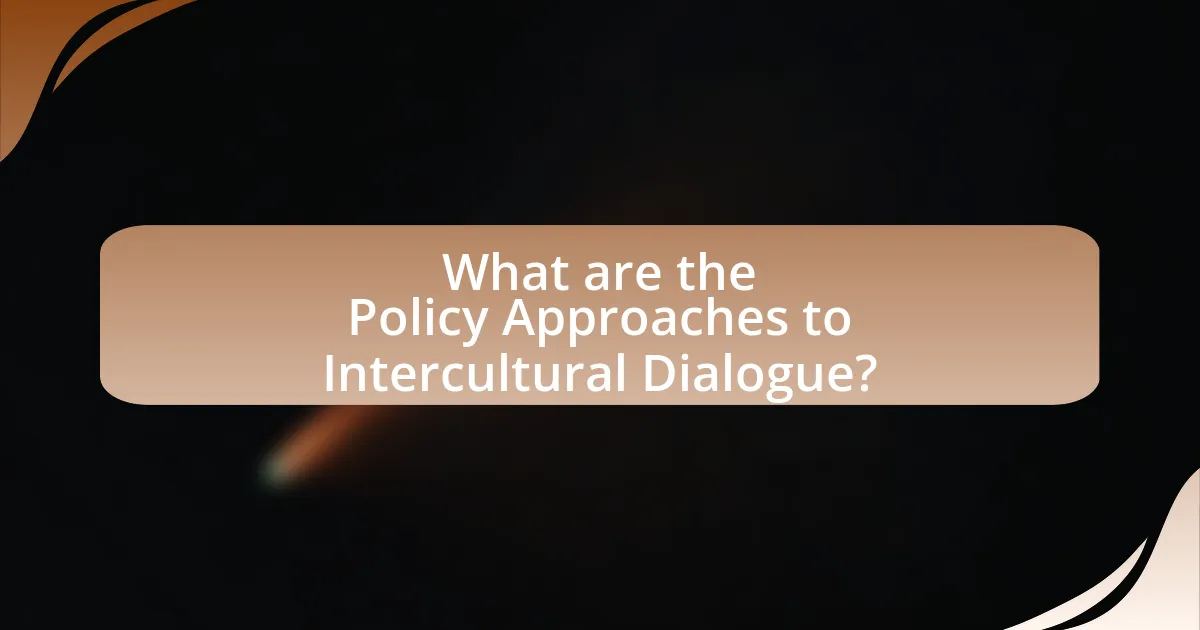
What are the Policy Approaches to Intercultural Dialogue?
Policy approaches to intercultural dialogue include promoting inclusivity, fostering mutual understanding, and enhancing cooperation among diverse cultural groups. These approaches often involve government initiatives, educational programs, and community engagement strategies aimed at reducing prejudice and building social cohesion. For instance, the Council of Europe emphasizes intercultural dialogue as a means to strengthen democratic values and human rights, highlighting the importance of cultural diversity in fostering peaceful coexistence. Additionally, UNESCO advocates for intercultural dialogue through its programs that encourage cultural exchange and collaboration, demonstrating the effectiveness of structured policies in achieving intercultural understanding.
How do different countries implement policies for Intercultural Dialogue?
Different countries implement policies for intercultural dialogue through various frameworks that promote understanding and cooperation among diverse cultural groups. For instance, Canada emphasizes multiculturalism and has established the Multiculturalism Act, which supports cultural diversity and encourages intercultural exchanges. In contrast, Germany has adopted integration policies that focus on language acquisition and social participation for immigrants, fostering dialogue through community programs. Additionally, the European Union promotes intercultural dialogue through initiatives like the “European Year of Intercultural Dialogue,” which aims to enhance mutual understanding among member states. These approaches demonstrate a commitment to fostering intercultural dialogue as a means to strengthen social cohesion and promote peace.
What are some successful national policies promoting Intercultural Dialogue?
Successful national policies promoting intercultural dialogue include the “National Integration Plan” in Germany, which aims to foster social cohesion through language courses and cultural exchange programs. This policy has led to increased participation of immigrants in society, as evidenced by a 2019 study showing that 70% of participants reported improved social interactions. Another example is Canada’s “Multiculturalism Act,” which encourages the preservation of cultural heritage while promoting shared values, resulting in a diverse yet unified society. Research indicates that this policy has contributed to Canada being ranked as one of the most welcoming countries for immigrants, with over 20% of the population identifying as a visible minority. These policies demonstrate effective frameworks for enhancing intercultural dialogue and social integration.
How do local governments contribute to Intercultural Dialogue initiatives?
Local governments contribute to Intercultural Dialogue initiatives by facilitating community engagement and promoting cultural exchange programs. They often organize events, workshops, and forums that bring together diverse cultural groups, fostering understanding and collaboration. For instance, the European Commission’s “Intercultural Cities” program highlights how local governments can implement policies that encourage dialogue among different communities, leading to enhanced social cohesion and mutual respect. Additionally, local governments may provide funding and resources to support intercultural projects, demonstrating their commitment to inclusivity and diversity.
What challenges do policymakers face in promoting Intercultural Dialogue?
Policymakers face several challenges in promoting intercultural dialogue, including cultural misunderstandings, political resistance, and resource limitations. Cultural misunderstandings can lead to miscommunication and conflict, making it difficult for diverse groups to engage meaningfully. Political resistance often arises from nationalistic sentiments or fear of losing cultural identity, which can hinder collaborative efforts. Additionally, resource limitations, such as insufficient funding and lack of trained personnel, restrict the implementation of effective dialogue initiatives. These challenges are supported by studies indicating that successful intercultural dialogue requires not only financial investment but also a commitment to education and community engagement to foster mutual understanding.
How can cultural biases affect policy implementation?
Cultural biases can significantly hinder policy implementation by distorting the perception of needs and priorities among different communities. When policymakers hold biases, they may prioritize policies that reflect their own cultural values rather than those that address the actual needs of diverse populations. For instance, a study by the Pew Research Center found that cultural misunderstandings can lead to ineffective public health policies, as seen during the COVID-19 pandemic, where certain communities faced barriers due to a lack of culturally sensitive communication. This misalignment can result in resistance from affected communities, ultimately undermining the effectiveness of the policy and leading to inequitable outcomes.
What strategies can overcome barriers to effective Intercultural Dialogue policies?
Strategies to overcome barriers to effective Intercultural Dialogue policies include fostering inclusive participation, enhancing cultural competency training, and promoting mutual understanding through education. Inclusive participation ensures diverse voices are heard, which can lead to more representative dialogue outcomes. Cultural competency training equips individuals with the skills to navigate and respect cultural differences, reducing misunderstandings. Education initiatives that focus on shared values and common goals can bridge gaps between cultures, as evidenced by programs that have successfully reduced tensions in multicultural communities. These strategies collectively create an environment conducive to meaningful intercultural exchanges.
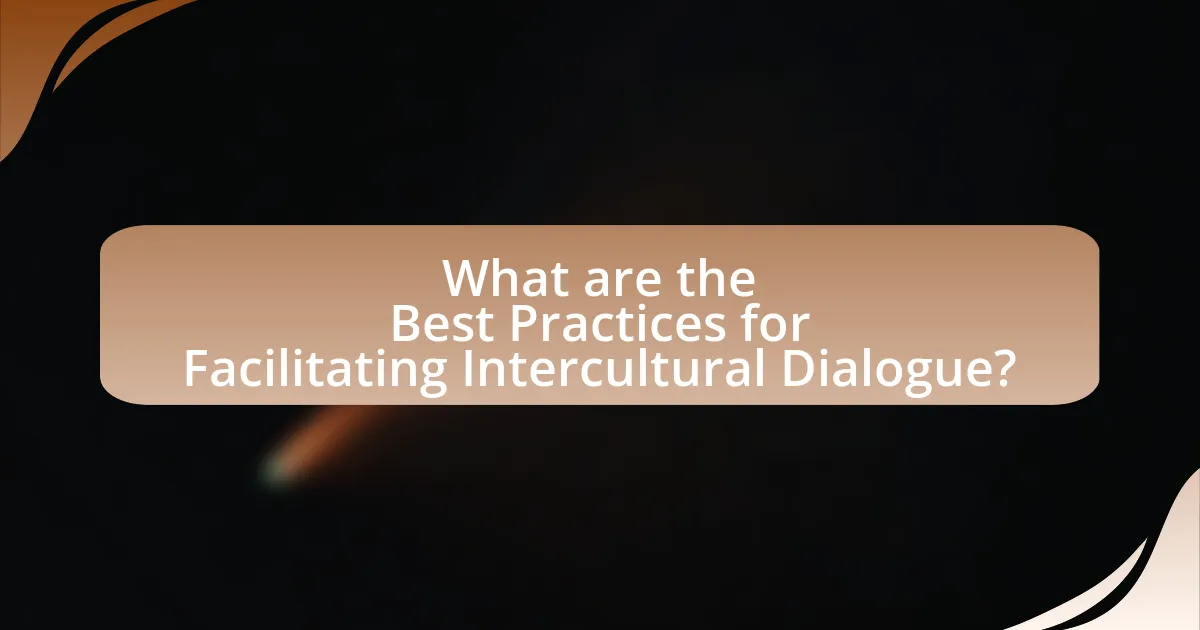
What are the Best Practices for Facilitating Intercultural Dialogue?
The best practices for facilitating intercultural dialogue include promoting active listening, fostering mutual respect, and encouraging open communication. Active listening allows participants to fully understand diverse perspectives, which is essential for meaningful dialogue. Fostering mutual respect creates a safe environment where individuals feel valued, leading to more productive interactions. Encouraging open communication helps to break down barriers and allows for the expression of differing viewpoints. Research by the United Nations Educational, Scientific and Cultural Organization (UNESCO) emphasizes that these practices enhance understanding and cooperation among cultures, ultimately contributing to social cohesion and peacebuilding.
What methods are effective in fostering Intercultural Dialogue?
Effective methods for fostering intercultural dialogue include promoting education and awareness, facilitating cultural exchanges, and encouraging collaborative projects. Education and awareness initiatives, such as workshops and training programs, help individuals understand diverse cultural perspectives, which is supported by studies showing that informed individuals are more likely to engage in constructive dialogue. Cultural exchanges, such as student exchange programs or community events, allow participants to experience different cultures firsthand, enhancing empathy and understanding. Collaborative projects, like joint community service or art initiatives, create shared goals that unite diverse groups, as evidenced by successful intercultural projects that have led to improved community relations and reduced prejudice.
How can educational programs enhance Intercultural Dialogue?
Educational programs can enhance intercultural dialogue by fostering understanding and respect among diverse cultural groups. These programs often include curricula that emphasize cultural awareness, communication skills, and conflict resolution strategies, which are essential for effective dialogue. For instance, studies show that students who participate in multicultural education are more likely to develop positive attitudes toward other cultures and engage in constructive conversations. Additionally, programs that incorporate experiential learning, such as cultural exchanges or collaborative projects, provide participants with firsthand experiences that deepen their appreciation for different perspectives. This approach is supported by research from the National Education Association, which highlights that inclusive educational practices lead to improved intercultural competencies and social cohesion.
What role do community organizations play in facilitating dialogue?
Community organizations play a crucial role in facilitating dialogue by serving as platforms for diverse voices and fostering inclusive conversations. These organizations often bring together individuals from various cultural backgrounds, enabling them to share experiences and perspectives, which enhances mutual understanding. For instance, studies have shown that community organizations can effectively reduce social tensions and promote cohesion by organizing events that encourage interaction among different groups. Additionally, they often provide resources and training that empower community members to engage in constructive dialogue, thereby strengthening social ties and promoting peace.
How can technology support Intercultural Dialogue?
Technology can support intercultural dialogue by providing platforms for communication and collaboration across diverse cultures. Digital tools such as social media, video conferencing, and online forums enable individuals from different backgrounds to share perspectives, engage in discussions, and foster mutual understanding. For instance, research by the Pew Research Center indicates that 72% of internet users engage with others from different cultures online, highlighting the role of technology in bridging cultural gaps. Additionally, language translation applications facilitate real-time communication, allowing participants to overcome language barriers and engage more effectively in dialogue.
What digital platforms are most effective for promoting dialogue?
Social media platforms such as Facebook, Twitter, and Instagram are most effective for promoting dialogue. These platforms facilitate real-time communication and interaction among diverse user groups, enabling the exchange of ideas and perspectives. For instance, a study by the Pew Research Center found that 69% of adults in the U.S. use Facebook, which serves as a significant space for discussions on various topics, including intercultural issues. Additionally, Twitter’s character limit encourages concise expression, fostering quick exchanges that can lead to deeper conversations. Furthermore, platforms like Reddit create community-driven discussions where users can engage in dialogue on specific interests, enhancing intercultural understanding.
How can social media be leveraged for Intercultural Dialogue initiatives?
Social media can be leveraged for Intercultural Dialogue initiatives by facilitating real-time communication and fostering connections among diverse cultural groups. Platforms like Facebook, Twitter, and Instagram enable users to share experiences, ideas, and cultural narratives, which can enhance mutual understanding and respect. For instance, campaigns such as #WeAreOne have successfully brought together individuals from various backgrounds to discuss shared values and challenges, demonstrating the potential of social media to create inclusive dialogues. Additionally, studies show that social media can increase engagement in intercultural discussions, with a report by the Pew Research Center indicating that 69% of adults use social media to connect with people from different cultures. This connectivity can lead to collaborative projects and initiatives that promote intercultural understanding on a broader scale.
What are some practical tips for engaging in Intercultural Dialogue?
To engage in intercultural dialogue effectively, individuals should prioritize active listening, which fosters understanding and respect among diverse perspectives. Active listening involves fully concentrating on the speaker, acknowledging their viewpoints, and responding thoughtfully, thereby creating a safe space for open communication. Additionally, individuals should educate themselves about other cultures, as knowledge about cultural norms and values enhances empathy and reduces misunderstandings. Research indicates that intercultural competence, which includes awareness and sensitivity to cultural differences, significantly improves dialogue outcomes (Deardorff, 2006). Furthermore, establishing common ground through shared interests or goals can facilitate more productive discussions, as it encourages collaboration and mutual respect.
How can individuals prepare for meaningful intercultural conversations?
Individuals can prepare for meaningful intercultural conversations by actively researching and understanding the cultural backgrounds of the people they will engage with. This preparation involves learning about cultural norms, values, and communication styles, which can significantly enhance mutual respect and understanding. For instance, studies show that individuals who are culturally aware are more likely to engage in effective communication, as they can navigate potential misunderstandings and adapt their conversational approaches accordingly. Additionally, practicing active listening and empathy can further facilitate deeper connections during these conversations, as it allows individuals to appreciate diverse perspectives and experiences.
What common pitfalls should be avoided in Intercultural Dialogue?
Common pitfalls to avoid in intercultural dialogue include stereotyping, lack of active listening, and assuming shared meanings. Stereotyping can lead to misinterpretations and reinforce biases, hindering genuine understanding. Lack of active listening prevents participants from fully grasping different perspectives, which is essential for effective communication. Assuming shared meanings can result in confusion and conflict, as cultural contexts often shape interpretations differently. These pitfalls can undermine the goals of intercultural dialogue, which aims to foster mutual respect and understanding among diverse groups.


